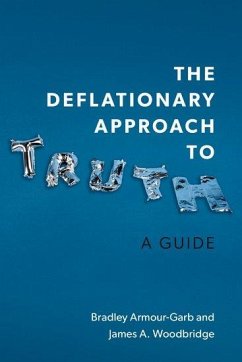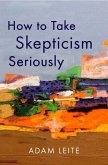- Gebundenes Buch
- Merkliste
- Auf die Merkliste
- Bewerten Bewerten
- Teilen
- Produkt teilen
- Produkterinnerung
- Produkterinnerung
"Deflationary" theories are views about truth that are often, but not always, characterized as accounts that accept the utility of the truth predicate without granting the metaphysical or epistemological assumptions that usually go along with it. The Deflationary Approach to Truth: A Guide presents a detailed, up-to-date, and historically informed survey and critical explication of the deflationary approach to the topic of truth, paying special attention to the wide range of different deflationary theories.
Andere Kunden interessierten sich auch für
![How to Take Skepticism Seriously How to Take Skepticism Seriously]() Adam LeiteHow to Take Skepticism Seriously121,99 €
Adam LeiteHow to Take Skepticism Seriously121,99 €![Bringing Krishna Back to India Bringing Krishna Back to India]() Claire C RobisonBringing Krishna Back to India116,99 €
Claire C RobisonBringing Krishna Back to India116,99 €![The Scope and Limits of Partiality The Scope and Limits of Partiality]() Diane JeskeThe Scope and Limits of Partiality88,99 €
Diane JeskeThe Scope and Limits of Partiality88,99 €![The Oxford Handbook of Evidence-Based Crime and Justice Policy The Oxford Handbook of Evidence-Based Crime and Justice Policy]() Daniel P MearsThe Oxford Handbook of Evidence-Based Crime and Justice Policy179,99 €
Daniel P MearsThe Oxford Handbook of Evidence-Based Crime and Justice Policy179,99 €![Fruitfulness Fruitfulness]() Chris HaufeFruitfulness35,99 €
Chris HaufeFruitfulness35,99 €![How Free Are We? How Free Are We?]() Taylor W CyrHow Free Are We?35,99 €
Taylor W CyrHow Free Are We?35,99 €![Thinking and Learning to Think Thinking and Learning to Think]() Schaeffer Nathan CThinking and Learning to Think32,99 €
Schaeffer Nathan CThinking and Learning to Think32,99 €-
-
-
"Deflationary" theories are views about truth that are often, but not always, characterized as accounts that accept the utility of the truth predicate without granting the metaphysical or epistemological assumptions that usually go along with it. The Deflationary Approach to Truth: A Guide presents a detailed, up-to-date, and historically informed survey and critical explication of the deflationary approach to the topic of truth, paying special attention to the wide range of different deflationary theories.
Produktdetails
- Produktdetails
- Verlag: Oxford University Press
- Seitenzahl: 344
- Erscheinungstermin: 10. Juni 2025
- Englisch
- Abmessung: 216mm x 140mm x 24mm
- Gewicht: 562g
- ISBN-13: 9780197577394
- ISBN-10: 0197577393
- Artikelnr.: 67865477
- Herstellerkennzeichnung
- Libri GmbH
- Europaallee 1
- 36244 Bad Hersfeld
- gpsr@libri.de
- Verlag: Oxford University Press
- Seitenzahl: 344
- Erscheinungstermin: 10. Juni 2025
- Englisch
- Abmessung: 216mm x 140mm x 24mm
- Gewicht: 562g
- ISBN-13: 9780197577394
- ISBN-10: 0197577393
- Artikelnr.: 67865477
- Herstellerkennzeichnung
- Libri GmbH
- Europaallee 1
- 36244 Bad Hersfeld
- gpsr@libri.de
Bradley Armour-Garb is Professor and Department Chair of Philosophy at the University at Albany-SUNY. His primary interests are in the philosophy of language, the philosophy of logic, and metaphysics with an interest in epistemology, and the philosophy of mathematics. Much of his work has regarded truth and paradox. He is the author and editor of several books. James A. Woodbridge is Associate Professor in the Philosophy Department at the University of Nevada, Las Vegas. His primary philosophical interests are in philosophy of language, metaphysics, and philosophical logic. He is the co-author, with Bradley Armour-Garb, of Pretense and Pathology: Philosophical Fictionalism and its Applications (2015).
* PART 1: WHAT DEFLATIONISM IS
* 1. Framing the General Approach
* 1.1 Deflationism vs. Inflationism
* 1.2 The Dimensions of Deflationism
* 1.3 On the Instability of "Partial Deflationism"
* 1.4 Motivations and Methodological Disputes
* 2. Early and Proto-Deflationary Accounts
* 2.1 Frege on Truth
* 2.2 Ramsey and the Redundancy Theory
* 2.3 Ayer on 'True'
* 2.4 Wittgenstein on Truth-Talk
* 2.5 Strawson on What We Do with Truth-Talk
* 2.6 Tarski and the (T)-Schema
* 3. The Species of Deflationism
* 3.1 Prosententialism
* 3.1.1 Prior's Adverbial Prosententialism
* 3.1.2 Williams's Substitutional Prosententialism
* 3.1.3 Grover, Camp, and Belnap's Atomic Prosententialism
* 3.1.4 Brandom's Operator Prosententialism
* 3.2 Disquotationalism
* 3.2.1 Quine's Disquotationalism
* 3.2.2 Leeds's Recursive Disquotationalism
* 3.2.3 Field's Pure Disquotational Truth
* 3.3 Minimalism
* 3.3.1 Horwich's Minimalism
* 3.3.2 Hill's Substitutional Minimalism
* PART 2. CHALLENGES TO DEFLATIONISM
* 4. Challenges to Linguistic Deflationism
* 4.1 Immanence and Limitations on Truth-Ascriptions
* 4.1.1 Immanence and Deflationism
* 4.1.2 Immanence, Foreign Sentences, Sentences Speakers Do Not
Understand
* 4.2 The Formulation and Generalization Problems
* 4.2.1 The Formulation Problem
* 4.2.2 Understanding the Generalization Problem
* 4.2.3 Justifying Generalizations vs. Proving Generalizations
* 4.2.4 Field and Hill on Proving Generalizations
* 5. Challenges to Metaphysical Deflationism
* 5.1 The Causal-Explanatory Role Challenge
* 5.1.1 Explaining the Success of Science
* 5.1.2 Explaining Behavioral Success
* 5.2 The Conservativeness Argument
* 5.2.1 Explaining the Conservativeness Argument
* 5.2.2 Responses to the Conservativeness Argument
* 5.2.3 Consequences of the Conservativeness Argument
* 5.3 The Correspondence Intuition, Truthmaking, and the Truth Property
Thesis
* 5.3.1 From the Correspondence Intuition to Truth-Maker Theory
* 5.3.2 The Truth-Property Thesis
* 5.4 The Challenge from Normativity
* 6. Challenges to Conceptual Deflationism
* 6.1 "Truth-Involving" Accounts That Deflationists Can Accept
* 6.2 "Truth-Involving" Accounts That Deflationists Must Replace
* 6.3 Deflationism and Theories of Meaning/Content
* 7. Formal Challenges and Paradox Treatment Deflationism
* 7.1 Constraints on an Adequate Resolution of the Liar Paradox
* 7.1.1 General Constraints on Adequate Paradox Treatment
* 7.1.2 Constraints for Paradox Treatment Deflationism
* 7.2 Tarski's Replacement Theory and the Liar Paradox
* 7.3 Kripke and Ungroundedness
* 7.4 Field on the 'Determinately' Operator
* 7.5 Grover and Semantic Inheritors
* 7.6 Horwich's Semantic Epistemicism
* 7.7 Deflationary Dialetheism
* 7.8 Deflationism, the Paradoxes, and Concluding Remarks
* Appendix: New Directions via Sentential-Variable Deflationism and
Alethic Fictionalism
* A.1 ASVD and the "How-Talk" NLI Approach
* A.2 The Merits of ASVD
* A.2.1 Avoiding the Formulation and Generalization Problems
* A.2.2 Emergence and Resolution of the Liar Paradox
* A.2.3 ASVD and the Conservativeness Argument
* A.2.4 Why Have a Truth Predicate?
* A.3 From ASVD to Alethic Fictionalism
* A.4 Conclusions: Accommodating Broad Four-Dimensional Deflationism
* Bibliography
* index
* 1. Framing the General Approach
* 1.1 Deflationism vs. Inflationism
* 1.2 The Dimensions of Deflationism
* 1.3 On the Instability of "Partial Deflationism"
* 1.4 Motivations and Methodological Disputes
* 2. Early and Proto-Deflationary Accounts
* 2.1 Frege on Truth
* 2.2 Ramsey and the Redundancy Theory
* 2.3 Ayer on 'True'
* 2.4 Wittgenstein on Truth-Talk
* 2.5 Strawson on What We Do with Truth-Talk
* 2.6 Tarski and the (T)-Schema
* 3. The Species of Deflationism
* 3.1 Prosententialism
* 3.1.1 Prior's Adverbial Prosententialism
* 3.1.2 Williams's Substitutional Prosententialism
* 3.1.3 Grover, Camp, and Belnap's Atomic Prosententialism
* 3.1.4 Brandom's Operator Prosententialism
* 3.2 Disquotationalism
* 3.2.1 Quine's Disquotationalism
* 3.2.2 Leeds's Recursive Disquotationalism
* 3.2.3 Field's Pure Disquotational Truth
* 3.3 Minimalism
* 3.3.1 Horwich's Minimalism
* 3.3.2 Hill's Substitutional Minimalism
* PART 2. CHALLENGES TO DEFLATIONISM
* 4. Challenges to Linguistic Deflationism
* 4.1 Immanence and Limitations on Truth-Ascriptions
* 4.1.1 Immanence and Deflationism
* 4.1.2 Immanence, Foreign Sentences, Sentences Speakers Do Not
Understand
* 4.2 The Formulation and Generalization Problems
* 4.2.1 The Formulation Problem
* 4.2.2 Understanding the Generalization Problem
* 4.2.3 Justifying Generalizations vs. Proving Generalizations
* 4.2.4 Field and Hill on Proving Generalizations
* 5. Challenges to Metaphysical Deflationism
* 5.1 The Causal-Explanatory Role Challenge
* 5.1.1 Explaining the Success of Science
* 5.1.2 Explaining Behavioral Success
* 5.2 The Conservativeness Argument
* 5.2.1 Explaining the Conservativeness Argument
* 5.2.2 Responses to the Conservativeness Argument
* 5.2.3 Consequences of the Conservativeness Argument
* 5.3 The Correspondence Intuition, Truthmaking, and the Truth Property
Thesis
* 5.3.1 From the Correspondence Intuition to Truth-Maker Theory
* 5.3.2 The Truth-Property Thesis
* 5.4 The Challenge from Normativity
* 6. Challenges to Conceptual Deflationism
* 6.1 "Truth-Involving" Accounts That Deflationists Can Accept
* 6.2 "Truth-Involving" Accounts That Deflationists Must Replace
* 6.3 Deflationism and Theories of Meaning/Content
* 7. Formal Challenges and Paradox Treatment Deflationism
* 7.1 Constraints on an Adequate Resolution of the Liar Paradox
* 7.1.1 General Constraints on Adequate Paradox Treatment
* 7.1.2 Constraints for Paradox Treatment Deflationism
* 7.2 Tarski's Replacement Theory and the Liar Paradox
* 7.3 Kripke and Ungroundedness
* 7.4 Field on the 'Determinately' Operator
* 7.5 Grover and Semantic Inheritors
* 7.6 Horwich's Semantic Epistemicism
* 7.7 Deflationary Dialetheism
* 7.8 Deflationism, the Paradoxes, and Concluding Remarks
* Appendix: New Directions via Sentential-Variable Deflationism and
Alethic Fictionalism
* A.1 ASVD and the "How-Talk" NLI Approach
* A.2 The Merits of ASVD
* A.2.1 Avoiding the Formulation and Generalization Problems
* A.2.2 Emergence and Resolution of the Liar Paradox
* A.2.3 ASVD and the Conservativeness Argument
* A.2.4 Why Have a Truth Predicate?
* A.3 From ASVD to Alethic Fictionalism
* A.4 Conclusions: Accommodating Broad Four-Dimensional Deflationism
* Bibliography
* index
* PART 1: WHAT DEFLATIONISM IS
* 1. Framing the General Approach
* 1.1 Deflationism vs. Inflationism
* 1.2 The Dimensions of Deflationism
* 1.3 On the Instability of "Partial Deflationism"
* 1.4 Motivations and Methodological Disputes
* 2. Early and Proto-Deflationary Accounts
* 2.1 Frege on Truth
* 2.2 Ramsey and the Redundancy Theory
* 2.3 Ayer on 'True'
* 2.4 Wittgenstein on Truth-Talk
* 2.5 Strawson on What We Do with Truth-Talk
* 2.6 Tarski and the (T)-Schema
* 3. The Species of Deflationism
* 3.1 Prosententialism
* 3.1.1 Prior's Adverbial Prosententialism
* 3.1.2 Williams's Substitutional Prosententialism
* 3.1.3 Grover, Camp, and Belnap's Atomic Prosententialism
* 3.1.4 Brandom's Operator Prosententialism
* 3.2 Disquotationalism
* 3.2.1 Quine's Disquotationalism
* 3.2.2 Leeds's Recursive Disquotationalism
* 3.2.3 Field's Pure Disquotational Truth
* 3.3 Minimalism
* 3.3.1 Horwich's Minimalism
* 3.3.2 Hill's Substitutional Minimalism
* PART 2. CHALLENGES TO DEFLATIONISM
* 4. Challenges to Linguistic Deflationism
* 4.1 Immanence and Limitations on Truth-Ascriptions
* 4.1.1 Immanence and Deflationism
* 4.1.2 Immanence, Foreign Sentences, Sentences Speakers Do Not
Understand
* 4.2 The Formulation and Generalization Problems
* 4.2.1 The Formulation Problem
* 4.2.2 Understanding the Generalization Problem
* 4.2.3 Justifying Generalizations vs. Proving Generalizations
* 4.2.4 Field and Hill on Proving Generalizations
* 5. Challenges to Metaphysical Deflationism
* 5.1 The Causal-Explanatory Role Challenge
* 5.1.1 Explaining the Success of Science
* 5.1.2 Explaining Behavioral Success
* 5.2 The Conservativeness Argument
* 5.2.1 Explaining the Conservativeness Argument
* 5.2.2 Responses to the Conservativeness Argument
* 5.2.3 Consequences of the Conservativeness Argument
* 5.3 The Correspondence Intuition, Truthmaking, and the Truth Property
Thesis
* 5.3.1 From the Correspondence Intuition to Truth-Maker Theory
* 5.3.2 The Truth-Property Thesis
* 5.4 The Challenge from Normativity
* 6. Challenges to Conceptual Deflationism
* 6.1 "Truth-Involving" Accounts That Deflationists Can Accept
* 6.2 "Truth-Involving" Accounts That Deflationists Must Replace
* 6.3 Deflationism and Theories of Meaning/Content
* 7. Formal Challenges and Paradox Treatment Deflationism
* 7.1 Constraints on an Adequate Resolution of the Liar Paradox
* 7.1.1 General Constraints on Adequate Paradox Treatment
* 7.1.2 Constraints for Paradox Treatment Deflationism
* 7.2 Tarski's Replacement Theory and the Liar Paradox
* 7.3 Kripke and Ungroundedness
* 7.4 Field on the 'Determinately' Operator
* 7.5 Grover and Semantic Inheritors
* 7.6 Horwich's Semantic Epistemicism
* 7.7 Deflationary Dialetheism
* 7.8 Deflationism, the Paradoxes, and Concluding Remarks
* Appendix: New Directions via Sentential-Variable Deflationism and
Alethic Fictionalism
* A.1 ASVD and the "How-Talk" NLI Approach
* A.2 The Merits of ASVD
* A.2.1 Avoiding the Formulation and Generalization Problems
* A.2.2 Emergence and Resolution of the Liar Paradox
* A.2.3 ASVD and the Conservativeness Argument
* A.2.4 Why Have a Truth Predicate?
* A.3 From ASVD to Alethic Fictionalism
* A.4 Conclusions: Accommodating Broad Four-Dimensional Deflationism
* Bibliography
* index
* 1. Framing the General Approach
* 1.1 Deflationism vs. Inflationism
* 1.2 The Dimensions of Deflationism
* 1.3 On the Instability of "Partial Deflationism"
* 1.4 Motivations and Methodological Disputes
* 2. Early and Proto-Deflationary Accounts
* 2.1 Frege on Truth
* 2.2 Ramsey and the Redundancy Theory
* 2.3 Ayer on 'True'
* 2.4 Wittgenstein on Truth-Talk
* 2.5 Strawson on What We Do with Truth-Talk
* 2.6 Tarski and the (T)-Schema
* 3. The Species of Deflationism
* 3.1 Prosententialism
* 3.1.1 Prior's Adverbial Prosententialism
* 3.1.2 Williams's Substitutional Prosententialism
* 3.1.3 Grover, Camp, and Belnap's Atomic Prosententialism
* 3.1.4 Brandom's Operator Prosententialism
* 3.2 Disquotationalism
* 3.2.1 Quine's Disquotationalism
* 3.2.2 Leeds's Recursive Disquotationalism
* 3.2.3 Field's Pure Disquotational Truth
* 3.3 Minimalism
* 3.3.1 Horwich's Minimalism
* 3.3.2 Hill's Substitutional Minimalism
* PART 2. CHALLENGES TO DEFLATIONISM
* 4. Challenges to Linguistic Deflationism
* 4.1 Immanence and Limitations on Truth-Ascriptions
* 4.1.1 Immanence and Deflationism
* 4.1.2 Immanence, Foreign Sentences, Sentences Speakers Do Not
Understand
* 4.2 The Formulation and Generalization Problems
* 4.2.1 The Formulation Problem
* 4.2.2 Understanding the Generalization Problem
* 4.2.3 Justifying Generalizations vs. Proving Generalizations
* 4.2.4 Field and Hill on Proving Generalizations
* 5. Challenges to Metaphysical Deflationism
* 5.1 The Causal-Explanatory Role Challenge
* 5.1.1 Explaining the Success of Science
* 5.1.2 Explaining Behavioral Success
* 5.2 The Conservativeness Argument
* 5.2.1 Explaining the Conservativeness Argument
* 5.2.2 Responses to the Conservativeness Argument
* 5.2.3 Consequences of the Conservativeness Argument
* 5.3 The Correspondence Intuition, Truthmaking, and the Truth Property
Thesis
* 5.3.1 From the Correspondence Intuition to Truth-Maker Theory
* 5.3.2 The Truth-Property Thesis
* 5.4 The Challenge from Normativity
* 6. Challenges to Conceptual Deflationism
* 6.1 "Truth-Involving" Accounts That Deflationists Can Accept
* 6.2 "Truth-Involving" Accounts That Deflationists Must Replace
* 6.3 Deflationism and Theories of Meaning/Content
* 7. Formal Challenges and Paradox Treatment Deflationism
* 7.1 Constraints on an Adequate Resolution of the Liar Paradox
* 7.1.1 General Constraints on Adequate Paradox Treatment
* 7.1.2 Constraints for Paradox Treatment Deflationism
* 7.2 Tarski's Replacement Theory and the Liar Paradox
* 7.3 Kripke and Ungroundedness
* 7.4 Field on the 'Determinately' Operator
* 7.5 Grover and Semantic Inheritors
* 7.6 Horwich's Semantic Epistemicism
* 7.7 Deflationary Dialetheism
* 7.8 Deflationism, the Paradoxes, and Concluding Remarks
* Appendix: New Directions via Sentential-Variable Deflationism and
Alethic Fictionalism
* A.1 ASVD and the "How-Talk" NLI Approach
* A.2 The Merits of ASVD
* A.2.1 Avoiding the Formulation and Generalization Problems
* A.2.2 Emergence and Resolution of the Liar Paradox
* A.2.3 ASVD and the Conservativeness Argument
* A.2.4 Why Have a Truth Predicate?
* A.3 From ASVD to Alethic Fictionalism
* A.4 Conclusions: Accommodating Broad Four-Dimensional Deflationism
* Bibliography
* index








